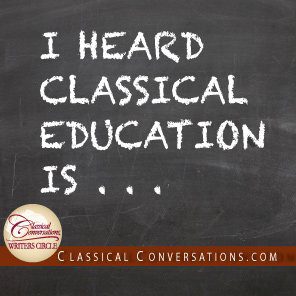As I have visited with parents over the years about the classical, Christian model of education, many have been overwhelmed by what seems to be “way too much to learn.” Many people have read books about classical education and found their heads swimming with thoughts of Latin, Greek, logic, ancient literature, and history. They find themselves thinking that their students could never tackle all of these subjects nor could they guide their students through them.
Nothing could be farther from the truth of classical education. Let’s consider two important ideas about a classical education. First, a classical education seeks to train students in certain skills. These skills are the habits of mind that will help students learn any subject. Secondly, a classical education seeks to train students in these skills by practicing them on quality content.
As Dorothy Sayers points out in her essay “The Lost Tools of Learning”: “First, he learned a language; not just how to order a meal in a foreign language, but the structure of a language, and hence of language itself—what it was, how it was put together, and how it worked.” In other words, the language itself is of secondary importance to the skills that are being learned. An education in Latin is beneficial because it trains students in the fundamental principles of language itself.
If we are truly focused on training students in the proper use of language, then we can rest in the assurance that we do not have to teach our students all languages. Instead, we will give them the precious gift of understanding how to rightly handle language. At that point, they will have a lifetime to master many languages. For now, we need to narrow.
According to Sayers, the other two skills that we must give them are those of dialectic and rhetoric. Dialectic is an extension of the grammar skills the student used to learn a language. Now that he knows how to learn language, dialectic will help him learn to use it: “how to define his terms and make accurate statements; how to construct an argument and how to detect fallacies in argument.”
Training students in the skill of grammar teaches them to understand language. Training students in the skill of dialectic teaches them to use language. Training them in the final skill—rhetoric—teaches them to use language well.
For Sayers, a rhetoric student “learned to express himself in language—how to say what he had to say elegantly and persuasively.”
Now, rather than being overwhelmed by a list of material that must be mastered, from phonics to calculus, we can take a deep breath and focus on developing these three skills of grammar, dialectic, and rhetoric. But, what about the subjects, I can hear you ask? After all, most of us spent our days divided into fifty-minute segments of studying subjects. While it is true that the subjects are less important than the skills, we must still consider the material on which students should practice these three skills.
In the Victorian era, poet Matthew Arnold engaged in a written debate with Thomas Huxley. Huxley argued that classical education was outdated in a modern, mechanized society. Arnold defended classical education as the keeper of culture. He wrote “[I] recommend culture as the great help out of our present difficulties; culture being a pursuit of our total perfection by means of getting to know…the best which has been thought and said in the world, and, through this knowledge, turning a stream of fresh and free thought upon our stock notions and habits.”
By necessity, a classical education does not seek to engage in too many things, but to cull from many things the best and necessary things. In other words, if one seeks to study the best that has been thought and said, one can ignore many things. We could read a lot of modern literature (which seems to be the favored method in AP literature courses) or we could introduce our students to Shakespeare and Homer. Not only will our students be enriched by the beautiful stories they encounter, but they will be enriched by the beautiful language in which the stories are told.
As parents who seek to revive a classical, Christian education, we must release ourselves from the notion that our students must master a huge amount of material. Instead, we should turn our attention to training them well in the skills of grammar, dialectic, and rhetoric. We should pull our materials from the best that has been thought, said, and written.
Sayers says it well: “to learn six subjects without remembering how they were learnt does nothing to ease the approach to a seventh; to have learnt and remembered the art of learning makes the approach to every subject an open door.”
Sources:
Dorothy Sayers, “The Lost Tools of Learning.” http://www.gbt.org/text/sayers.html
Matthew Arnold, “Culture and Anarchy.” https://www.authorama.com/culture-and-anarchy-1.html
Previous Articles in This Series:
Classical Education Myth #1: Classical education is just rote memorization.
Classical Education Myth #2: It’s all about teaching dead languages.
Classical Education Myth #3: Classical education is just not creative.




